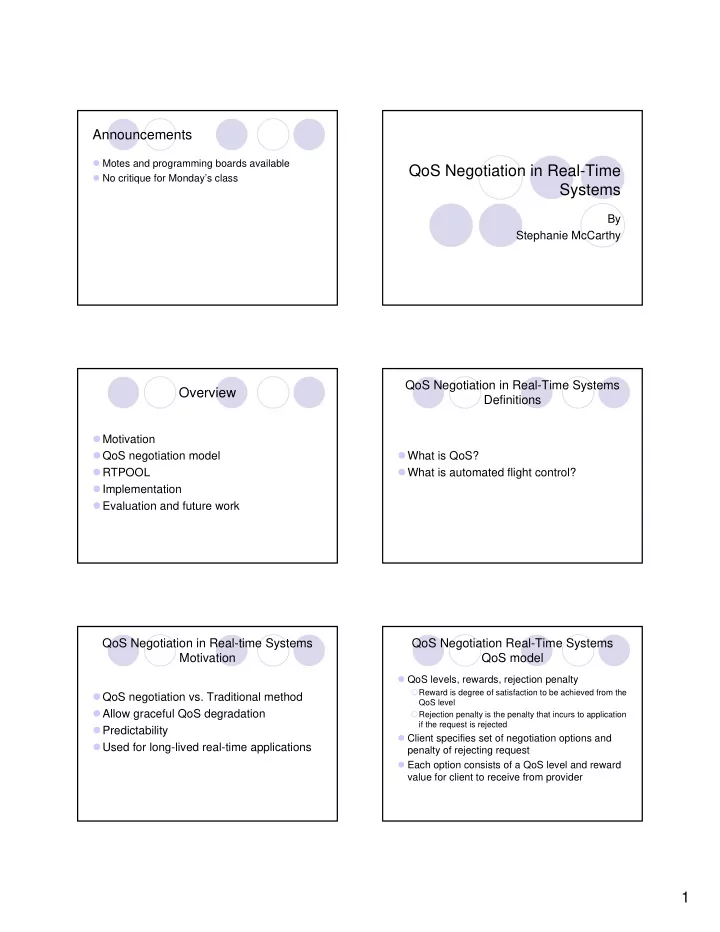

Announcements � Motes and programming boards available QoS Negotiation in Real-Time � No critique for Monday’s class Systems By Stephanie McCarthy QoS Negotiation in Real-Time Systems Overview Definitions � Motivation � QoS negotiation model � What is QoS? � RTPOOL � What is automated flight control? � Implementation � Evaluation and future work QoS Negotiation in Real-time Systems QoS Negotiation Real-Time Systems Motivation QoS model � QoS levels, rewards, rejection penalty � Reward is degree of satisfaction to be achieved from the � QoS negotiation vs. Traditional method QoS level � Allow graceful QoS degradation � Rejection penalty is the penalty that incurs to application if the request is rejected � Predictability � Client specifies set of negotiation options and � Used for long-lived real-time applications penalty of rejecting request � Each option consists of a QoS level and reward value for client to receive from provider 1
QoS Negotiation in Real-Time Systems QoS Negotiation in Real-Time Systems Qos Model QoS model � QoS levels are expressed in terms of Request parameters Service Client � Examples of parameters Provider 1) Negotiation Option a) Acceptable QoS levels � Traffic delay and jitter requirements in real-time b) Reward communications 2) Rejection Penalty � Required processor bandwidth in processor capacity reservation QoS Negotiation Real-Time Systems QoS Negotiation Real-Time Systems QoS Model QoS model � Advantages of letting the service provider � Guaranteeing a clients request is the pick the QoS level certification of the request to receive � Application code makes no assumption of service at one of the QoS levels but the resource availability or capacity service provides picks the actual QoS � Achieve higher over-all performance while level maintaining QoS guarantee � The service provider can switch the QoS level if it perceives increased utility. QoS Negotiation Real-Time Systems QoS Negotiation in Real-Time Systems RTPOOL RTPOOL � Designed to test QoS model � Pool of shared processors � A clients task is specified by parameters � Provide timeliness guarantees for flight � Task execution time should not be control included in parameter � Clients are application tasks � Programmer can define different versions of the same task 2
QoS Negotiation in Real-Time Systems QoS Negotiation in Real-Time Systems RTPOOL Implementation � Local Optimization Heuristic Scheduling and QoS negotiation � Re-computes set of QoS levels when new task � Qthread arrives � Lowest layer of RTPOOL � Task Rejection � Force_Negotation() primitive initiate QoS � Unfulfilled potential reward (UPR) negotiation � Load Sharing Algorithm � Implements a distributed QoS-optimization protocol QoS Negotiation in Real-Time Systems QoS Negotiation Real-Time Systems Implementation Implementation Invocation Migration Pool Membership API � Implements QoS optimization protocol � Maintain consistent view of current � QoS optimization Heuristic membership in the shared resource pool � Subscribe_to_pool() � Force_negotiation() � Unfulfilled potential reward � Wire_task() � Machine failure QoS Negotiation in Real-Time Systems QoS Negotiation in Real-Time Systems Implementation Application to Flight Control � QoS negotiation supports mission Communication API � Executable applications composed of planning techniques in context of CIRCA tasks � CIRCA-build a set of control plans to keep � Send() and Receive() primitives system safe � Communication protocol stack � Probabilistic planning implemented using a xKernal 3.2 and � Mission Planner layered on top of UDP/IP stack 3
QoS Negotiation in Real-Time Systems QoS Negotiation in Real-Time Systems Description of Flight Tasks Evaluation � Guid � Ctrl � Heuristic testing � FNav � Aircraft performance with ctrl and Fnav tasks � SNav � Load Sharing QoS Negotiation in Real-Time Systems QoS Negotiation in Real-Time Systems Evaluation Evaluation � Task is fixed � Tested on ability to control the simulated F-16 during flight � decreased CPU speed (increases task � Evaluation using Ctrl and Fnav tasks execution time) which are coupled � Optimality is compromised but graceful degradation is achieved QoS Negotiation in Real-Time Systems QoS Negotiation in Real-Time Systems Evaluation Future Work � Two Machines run functionally � Currently studying alternative QoS � Shut down one machine to simulate failure optimization methodologies and scalability of this QoS approach just after take-off � Negotiable fault tolerance QoS as an � Conventional method failure extension to RTPOOL 4
Recommend
More recommend